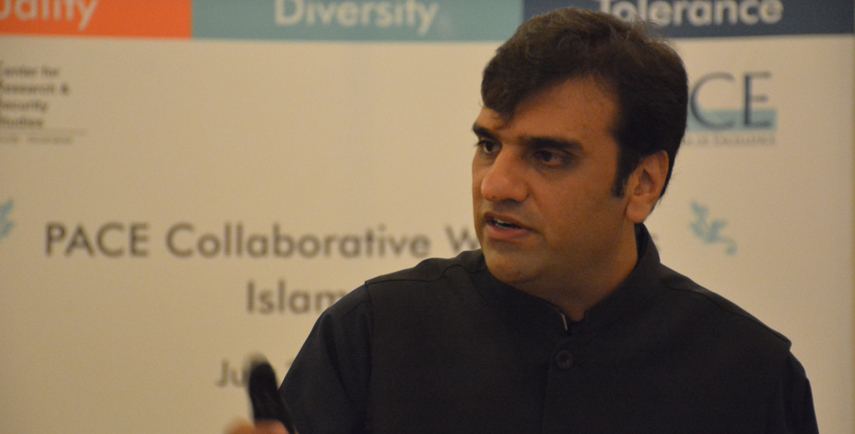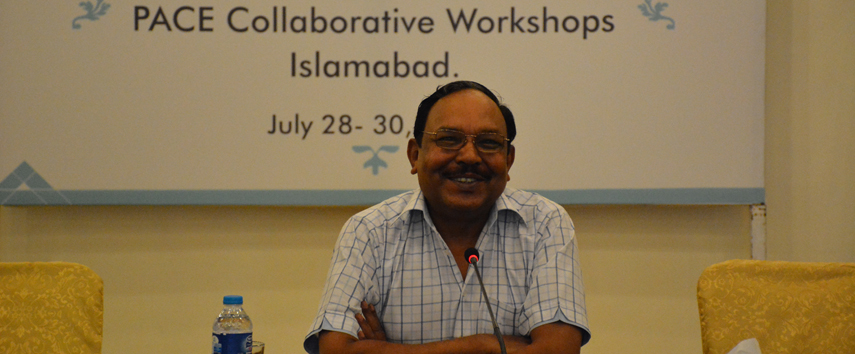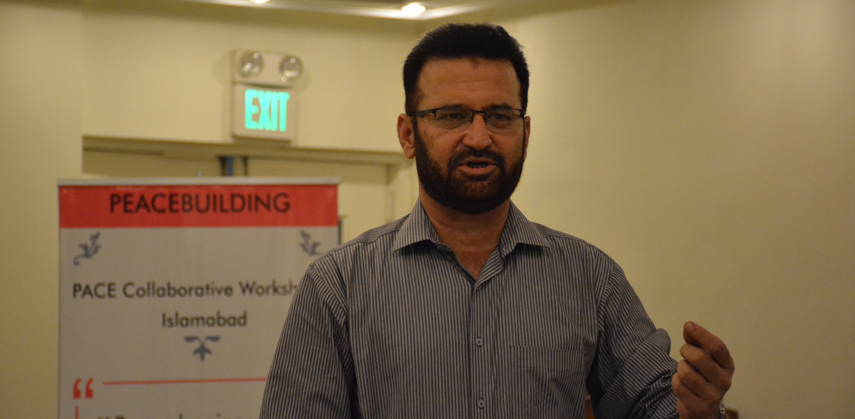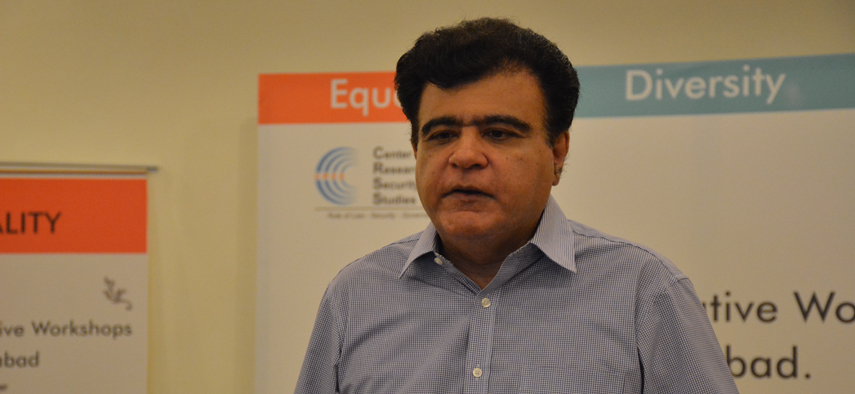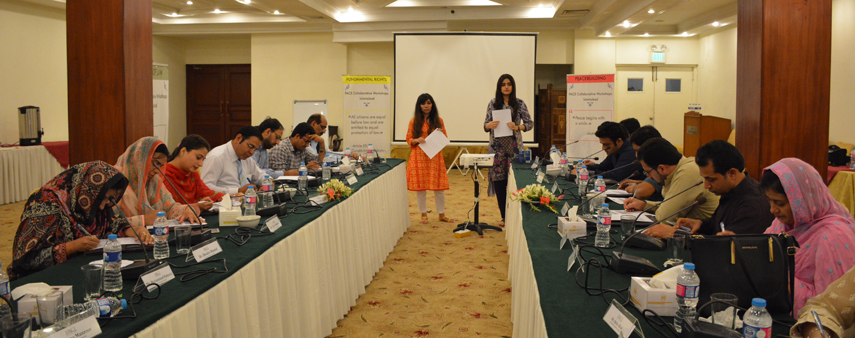The Center for Research and Security Studies (CRSS) conducted the 19th three-day PACE Collaborative workshop for young university lecturers and professors from July 28 – 30, 2017, at Hill View Hotel, Islamabad. The workshop was conducted under the umbrella of the Pakistan Center of Excellence (PACE), a counter-radicalization, pluralistic values focused project, in collaboration with the Dutch Government.
Participants included young university lecturers and professors from University of Sargodha, Sargodha, Isra University, Tando Jam, Liaquat Medical University, Jamshoro, Institute of Southern Punjab, Multan, FATA University, FR Kohat, and Bahauddin Zakariya University, Multan.
Opening Ceremony
Ms. Farhana Kanwal, Project Coordinator, PACE, CRSS, welcomed participants to the workshop, saying that PACE is put together by CRSS to counter radicalization, inculcate critical thinking, question preconceived notions and narratives, and embed the national discourse in constitution and the rule of law. She said that PACE is grounded in the universal values of tolerance and acceptance; tolerance is one virtue that leads to range of other factors such as perseverance, coexistence and the idea of peace building. She elaborated that adherence to rule of law, respect for diversity, opinions and rights, and ideas of perseverance, coexistence, peace building and tolerance can be inculcated in the minds of the youth only by the teachers ; the gate keepers of the future. She shared rules and regulations of the workshop with participants.
Workshop Core Areas
The young professionals were trained in following areas:
- Leadership and motivation
- Equal citizenry and respect for rule of law
- Fundamentals of democracy, governance and accountability
- Respect for diversity, opinions and rights
- Rights of minorities and other marginalized groups
- Constitutionalism, and adherence to Pakistan’s Constitution, particularly articles 8-28
- The importance of asking critical questions in the pursuit of knowledge
Workshop Modules
The cadre of young lecturers was trained by the experts in the above mentioned fields including: Dr. Khalid Zaheer, Brigadier Samson Sharaf, Mr. Safiullah Gul, Dr. Niaz Murataz, and Mr. Ammad Khaliq.
Dr. Khalid Zaheer kicked off the first session of the day and spoke on the topic of religious intolerance. He explained, “Religious tolerance is the right one should give to others to believe in and practice faith of their choice. We can’t impose our views on others and we can’t blame others for their beliefs and ideas. You can’t respect a view despite of strongly disagreeing with it but you can show tolerance towards it. When we say, we allow other to have religious freedom and we can’t impose our point on other genuinely, that is called religious tolerance. We have no right to impose our beliefs on others. Our attitude toward other’s beliefs should be genuine and positive. People usually believe in and practice ideas and beliefs what they have learnt from their elders or what they have been convinced by. Islam teaches us not to use abusive language for other religions or faiths and respect them. If Islam says so; then why some Muslims are intolerant? There are a few arguments in front of them that are making them violent and intolerant. There is also a restrained religious setting who cut people off the society and there is always confinement in communication. Questioning is not allowed in such environments and they make you blindly follow the ones who lead such groups. We need to get rid of such environments, groups and thinking that are leading us to extremism and religiously intolerant society. We should not be violent towards the people who are not of same belief what we believe in. Everyone has right to do whatever they want and believe. Being humans, we expect others to tolerate us; same is what they expect from us.”
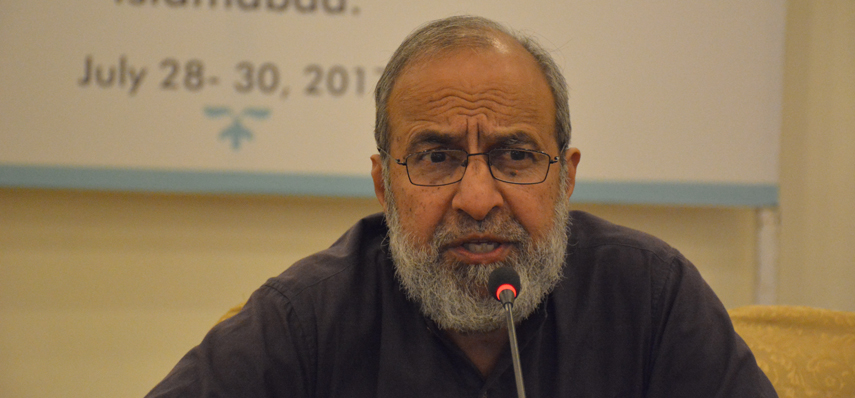
Mr. Ammad Khalique kicked off his session on “Media & Ethics”. He started with the definition of “Media” and “Ethics”, media is the collective communication outlet or tool that is used to store and deliver information or data. Specialized mass media channels include print media, social/digital media, photography, advertising, cinema, and broadcasting (Radio, TV). Speaking on the freedom of expression, he referred to Article 19 of the UN Charter, “Everyone has the right to freedom of opinion and expression; this right includes freedom to hold opinions without interference and to seek, receive and impart information and ideas through any media and regardless of frontiers.”
He defined ethics as the way people behave based on their beliefs about what is right and wrong and how it influences their behaviors and values. He shared his views on ethics in journalism with following points:
- Seek truth and report it
- Minimize harm
- Act independently
- Maintain standards of decency
- Be accountable
He also said that being neutral and presenting authentic news is one of the values that should be kept in mind while reporting certain issues. Media is bound in some cases and cannot be open and expose the facts. He said that words are sometimes misinterpreted and other times twisted when reporting sensitive issues; therefore, extreme care should be taken while debating on such issues. He stressed that the reporters while broadcasting should use decent language.
He shared few laws and ethics that are binding upon media:
- Cyber Stalking
- Cyber Bullying
- Cyber Masking
- Cyber Frauds
- Hate Speech
- Defamation
- Intrusion to Privacy
- Harassment
- Cyber Crime Bill 2016
- Cyber Wing (FIA)
Brigadier Samson Sharaf kicked off first session of the day on the topic of “rule of law”. He talked about transparency, predictability, stability, accountability as major elements required for the establishment of rule of law. He said, “We won’t be able to make everyone answerable before law until we follow these rules in our daily lives. Even all the religions of the world give us a certain kind of code of conduct to have a comprehensive idea of do’s and don’ts.”
Mr. Safiullah Gul was the first speaker of the last day and spoke on the topic of “leadership and motivation”. He emphasized the extent to which effort is directed toward a goal, and its components: activation, persistence and intensity.
He elaborated the phrase that he who fails to plan actually plans to fail and shared a story of the people who alone changed the course of history with motivation and persistence despite of all the opposition from the society. Being alone doesn’t matter if you are determined to achieve your goals and objectives. You only have to overcome the fears and insecurities to move towards the achievement of your goals. An individual sometimes can set an example and become motivation for others.
His session, filled with activities to enhance creative and critical thinking, focused on looking at things from a slightly different perspective to encourage problem-solving.
Mr. Niaz Murtaza shared his views on the concept of democracy and good governance. He said that any institution at its initial stage is never stable, and the same is the case with democracy. But once it is stable and mature, democracy starts delivering. “When we look back at the history of Pakistani politics, Pakistan has never been stable,” he added. It could never see the fruits of stable and mature democracy. Political scientists state that from stable institutions emerge egalitarian societies. Egalitarian societies are the ones where people have equal access to education, capital, opportunities and freedoms. In such societies, strong institutions, able leadership and good governance emerge and development takes place.
Ms. Farhana Kanwal, Project Coordinator PACE, in her concluding remarks, insisted that there is a dire need to revisit the widespread preconceived notions that have been passed through our cultural values in the society over generations. Teachers, with the responsibility of imparting values to the young generation in educational institutions, are the most valuable engines that can challenge common negative narratives that promote hatred and bigotry. She said that teachers have the ability to shape an entire generation’s mindset to propagate tolerance, diversity and equality.
She shared that participants need to conduct these activities with their students to inculcate adherence to the rule of law and equal citizenry. CRSS provides financial and logistic support in this regard to lecturers and professors so that they can foster the universal ideals of tolerance and diversity in the young generations.

